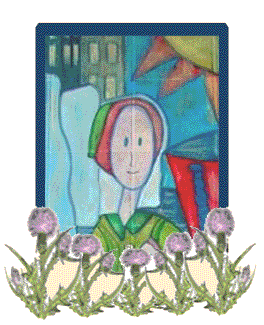Newfoundland War Brides
 |
 |
 |
Roses and Thistles
G.J. CASEY AND MAURA C. HANRAHAN
SANDRA GRAHAM DWYER
In remembering her wartime years, Sandra speaks of a particular friendliness, almost a kinship, that existed between the Scottish people and the men of the Newfoundland Overseas Forestry Unit, who came by the hundreds to work in the neighbouring forests. On November 10, 1943. after a three year courtship, Sandra married John Dwyer, one of these Newfoundland foresters.
By this stage, Sandra had converted to Roman Catholicism, the religion of her husband. Her father, a devoted member of the Free Church of Scotland, had objected, contending "You should marry somebody of your own creed." His stance weakened once he met her husband-to-be, and he not only gave her away at the church ceremony but also sponsored the wedding "supper" at the local hotel. Three years later when his daughter. son-in-law and grandson were leaving for Newfoundland, he gave her "a little firkin' of whisky" in case "your spirits might get very low before you get there". Sandra still emotionally recalls her father's parting words: "Remember if you want to come home, money is no object. Let me know, and I'll get you home"."
In July, 1946, Sandra and John settled with their one year old son, Ian, in the Conception Bay outport where John was born and raised. Once there, Sandra found that for much of the time she had to be both mother and father to her sons, as well as household manager and farmer. Like so many rural Newfoundland men of his generation, John was habitually away working on construction or other projects in different parts of the province for weeks and sometimes for months at a stretch. In fact, just six weeks after their arrival Sandra's husband left home for three months to do construction work in a different part of the island. One of Sandra's first difficulties was to adjust to the local pattern of doing house chores. She claims:
Although it was a hard life, Sandra would not change any of it for the world. With enormous grit and fortitude she accepted and adjusted to the lifestyle of the area. She found the local people to be a comfort to her:
While Sandra always looked forward to her husband's return from one of his jobs, she continued to care for their horse, cows, hens, and sheep without difficulty because they were chores she had mastered while growing up on her father's farm. She supplied her mother-in-law with fresh cream in exchange for churned butter. She also grew a variety of vegetables, including cabbages, potatoes, carrots and turnips, and made most of the clothes for her sons, just as so many Newfoundland outport women had done for hundreds of years. Sandra philosophically states: "I was curious as to what was coming next ... you just took it in your stride ... well, it had to be done, and you went and did it. Whereas, perhaps someone would sit down and cry over it, I didn't. I kept going and I'm glad I did".
This is not to suggest that Sandra adapted quickly and blended easily into the daily routine and life of the town. She recalls that "first night in a strange place, I wasn't sleeping". She kept thinking about breakfast and carrying out the household chores the next day with her husband's stepmother. It was some of these household chores that caused Sandra the most grief, especially when her husband was away from home for extended periods at work. She found it difficult to chop wood and especially "to make splits for starting the morning fire". Learning new and different culinary skills often was not easy and was punctuated by various failures. Neither was having to place "big pots on the old Waterloo stove to heat water", which had to be brought from the neighbouring well. Likewise washing in a tub with a scrubbing board was a new chore to be mastered and "was one of the hardships I had when I came here, especially when it came to washing the blankets. No wringer. Just wring them with the two hands".
Sandra was most conscious of her perceived inability "to fit in" during the public rituals and ceremonies in the Roman Catholic Church. She felt she "had no words", claiming:
I didn't know any of theroutine of the church.... It was alI different to me. That was the most difficult thing for me in church, here in public. and when you have to respond. Well, what can you say? You can't say it, when you don't know it.
Later Sandra became more involved in the church, prepared the altar and carried out other such activities. She explains that her knowledge of the church "doesn't bother me any more now. For years it didn't bother me".
Unlike Anna who had settled in SI. John's, Sandra was not surrounded by war brides. Only two other young war brides lived near Sandra, and they became friends. Partly because of this isolation from other women like herself, Sandra assimilated into her outport community through gradual involvement in a variety of church and school activities - once her children were older. She still thinks of herself as "a native daughter of Scotland" but has also developed a strong loyalty to Newfoundland and Canada. In fact, she expresses the general feeling of many other Newfoundland war brides, when after a forty-five year residency, she affirms:
My roots are there (in Scotland), and that's where my main roots are, although my home is here. And this is a home to me. But the roots are calling back. This has been a home to me away from home.
To read the complete File see:
Memorial Library
Author: Casey, George J.
Author: Hanrahan, Maura C.
Title: Roses and thistles: Second World War brides in Newfoundland
Journal: Newfoundland Studies, Fall 1994, Vol. 10(2), pp. 240-249.
Subject: WOMEN and WOMEN'S STUDIES
Subject: SOCIAL LIFE and CUSTOMS
Subject: HISTORY-20th Century
Article Type: Article
Note: bib
MUN Holdings: Click here for MUN library holdings:
http://info.library.mun.ca/uhtbin/issn-search2/0823-173

| Yearbook | References | Citizenship | Photo Album | Links |
| Submit Info | Contact Us | Comments |